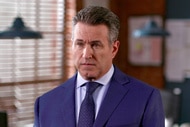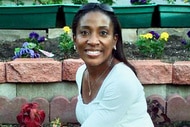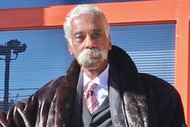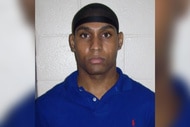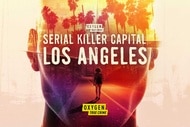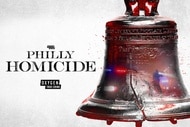Create a free profile to get unlimited access to exclusive videos, breaking news, sweepstakes, and more!
What Happened To Russell Gibbons, The Black Bensonhurst Resident Involved In The Mob That Killed Yusuf Hawkins?
"I was a Black kid in a white neighborhood and I wanted to be a white kid living in a white neighborhood," Russell Gibbons said in HBO's "Yusuf Hawkins: Storm Over Brooklyn."

One of the more notable figures featured in the new HBO documentary "Yusuf Hawkins: Storm Over Brooklyn" is the lone Black man who was part of the largely white mob that attacked and killed 16-year-old Yusuf Hawkins in 1989.
Hawkins and a few friends had come to the working class, predominantly Italian-American neighborhood of Bensonhurst, Brooklyn to look at a used car on the evening of Aug. 23. Hawkins was from the largely Black neighborhood of East New York, about seven miles away.
Hawkins' group was set upon by a mob of dozens of teens who were allegedly waiting to attack Black or Hispanic youths they believed were involved with a white girl in the neighborhood — Gina Feliciano, according to an archived 1989 report from The New York Times.
Hawkins was fatally shot during the attack.
The mob of attackers was almost entirely white, with one notable exception: Russell Gibbons.
"I was a Black kid in a white neighborhood and I wanted to be a white kid living in a white neighborhood," Gibbons told the documentary.
Gibbons placed blame on Feliciano, who had allegedly told former boyfriend Keith Mondello that she would bring a group of Black people into the largely white neighborhood to beat him up. Mondello contended to police that he organized a group of his own in response — and it was that group that ended up assaulting Hawkins and his small group of friends.
In later interviews with police, Feliciano contended that Mondello was lying and he'd organized the mob in a pre-emptive plot to attack her friends because he was racist. Feliciano told her friends not to show up that night.
Gibbons said the racial dynamics of the attack hadn't entered his mind at the time.
"Personally, I wasn't thinking about race because my friends were there," Gibbons told the documentary.
Gibbons had friends in the group that ended up attacking Hawkins and he testified in court that he supplied baseball bats to the mob but didn't personally see Hawkins get shot, according to an Associated Press report from 1990. He is referred to by the full name of Joseph Russell Gibbons in prior reports.
"There was a group of us that stayed back because we didn't take it seriously," he told the documentary.
Gibbons contended to the documentary he didn't bring bats for "that specific reason."
"It's not like we handed them out and said 'Here's a bat for you, here's a bat for you.'" However, audio of Gibbons' police interview appears to contradict that claim.
Although Gibbons said he supplied bats, he didn't participate in the attack on Hawkins, according to the New York Times.
Hawkins' killing ignited a series of heated and often violent protests and marches led by civil rights activist the Rev. Al Sharpton, who became a spokesperson for the Hawkins family in the wake of Yusuf's death.
Sharpton led a number of marches through Bensonhurst that were met with racist taunts, threats and confrontations that roiled not just Brooklyn, but all of New York City. Groups like the Nation of Islam also advocated for Hawkins in the wake of his killing.
Two ringleaders of the mob — Mondello and Joseph Fama — were ultimately convicted and sentenced in 1990 for killing Hawkins, The Washington Post reported at the time. While Fama received a sentence of 30 years to life for pulling the trigger, Mondello received a minimum sentence of five years after being convicted on a slew of riot charges but acquitted of the most serious charges against him.
What Happened To Russell Gibbons?
For testifying for the prosecution, Gibbons received immunity and wasn't charged in connection with Hawkins' killing. His testimony provided evidence that pointed toward Fama as the gunman who shot Hawkins, the New York Times noted in 1990.
While Gibbons' presence in the mob might have complicated prosecutors' efforts to claim Hawkins' killing was solely motivated by race, Gibbons also testified that he heard "one or two" racial slurs from the mob that attacked Hawkins, he testified in 1990, according to press agency UPI.
Still, Gibbons didn't support the protests that followed Hawkins' killing and blamed Sharpton for the heightened racial tensions that roiled Brooklyn in the aftermath, according to the documentary.
The director of the documentary, Muta’Ali Muhammad, said he believed Gibbons was being honest, but found his point of view confounding — speaking as a Black man who grew up in a white community himself
"One of the things that frustrates me about Russell — I went to an all-white high school and I’ve had to struggle with different challenges, being the only Black person, except for my brother and sister. But I disagree a lot with what Russell says. And I think there’s always an excuse to change the conversation [to] 'Okay, racist things just happen.' There’s always an excuse or a way to deflect, and I think that Russell is full of those deflections," the director told MEL Magazine.
"I do believe that he wholeheartedly believes that Al Sharpton caused more harm than good. I respect his honesty — I just really disagree with him."
Attempts to reach Gibbons for comment were not successful.
"Yusuf Hawkins: Storm Over Brooklyn" is available to stream on HBO Max.




